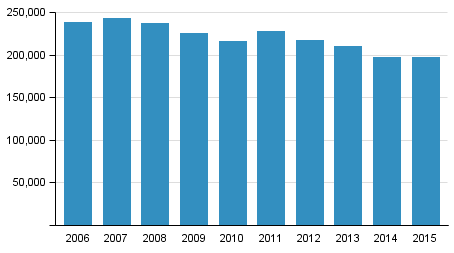Published: 18 May 2016
Police, customs and border guard used coercive measures 197,600 times in 2015
According to Statistics Finland's data, the police, customs and border guard used coercive measures 197,600 times in 2015. The number was 850 coercive measures (0.4 per cent) higher than one year previously. Nearly one-third of the coercive measures were apprehensions based on the Police Act (known as taking intoxicated persons into custody), where it is a question of ensuring the safety of the person or his or her environment. Other types of coercive measures were almost always connected to investigating the guilt of a suspect or ensuring the criminal process.
Coercive measures of the police, customs and border guard in 2006 to 2015

At the beginning of 2014, new coercive measures came into force: search of data contained in a device and search of premises. A search of data contained in a device refers to a search directed to the data content contained in a computer, a terminal end device or in another corresponding technical device or information system. In 2015, altogether 5,500 searches of data contained in a device were performed, which was 33.1 per cent more than in 2014. A search of premises refers to a search conducted elsewhere than in a public place but not a domicile. Searches of premises numbered 5,600, most of which were carried out to find an object or property to be confiscated. Compared with the previous year, 18.5 per cent more searches of premises were performed.
The number of intoxicated persons taken into custody has fallen in recent years. The number of intoxicated persons taken into custody was 59,800 in 2015, which is 1,500 cases (2.5 per cent) lower than in 2014. Taking intoxicated persons into custody is a coercive measure based on the Police Act, where the object of the coercive measure is usually not suspected of an offence. In addition to taking intoxicated persons into custody, other main coercive measures include apprehension or arrest of a suspect in an offence, bodily search and physical examination and possible confiscation related to them, and confiscation or house search and confiscation.
In 2015, 24,700 apprehensions were made, which is 300 cases (1.3 per cent) lower than in the year before. The number of arrests was 9,550, up by 400 cases (4.4 per cent) from one year earlier. The number of apprehensions was 2,660, which was 490 cases (22.5 per cent) more than in 2014 and 10 per cent more than in 2013.
The number of bodily searches and physical examinations and possible confiscations related to them increased by 2.4 per cent from the previous year. Their number was 25,900 in 2015. Confiscations and house searches possibly made in their connection numbered 37,800, which was 650 cases (1.7 per cent) lower than in the year before. The number of confiscations and house searches has decreased considerably since 2013 as part of them are now recoded as searches of premises or searches of data contained in a device.
In all, 8,200 examinations of state of intoxication with a precision breathalyser were recorded in 2015, which was 300 cases (3.8 per cent) fewer than in 2014. The number of examinations of state of intoxication with a blood test was 11,500 in 2015, which was 200 cases (1.7 per cent) more than in 2014. The numbers were relatively low for other types of coercive measures. A total of 25,800 coercive measures were directed to women, being 13.1 per cent of all coercive measures. Women's shares were small in all types of coercive measures.
Investigations of drunken driving in 2014 and 2015
| Investigation/year | 2014 | 2015 |
| Breath alcohol | 8,528 | 8,206 |
| Request to examine state of intoxication 1) | 11,345 | 11,538 |
| Of which | ||
| ...Blood alcohol | 7,225 | 6,705 |
| ...Narcotics | 5,254 | 6,123 |
| ...Consumption after driving | 1,734 | 1,644 |
| ...Theoretical statement on state of intoxication | 261 | 237 |
The statistics on Offences known to the police and on Coercive measures were combined in March 2015. Data released prior to that can be found on the old home pages of the statistics. The web pages of the statistics on Offences known to the police: http://www.tilastokeskus.fi/til/polrik/index_en.html and of the statistics on Coercive measures: http://tilastokeskus.fi/til/pkei/index_en.html
Source: Statistics on offences and coercive measures 2015. Statistics Finland
Inquiries: Kimmo Haapakangas 029 551 3252, rikos@stat.fi
Director in charge: Jari Tarkoma
Publication in pdf-format (213.1 kB)
- Tables
-
Tables in databases
Pick the data you need into tables, view the data as graphs, or download the data for your use.
Appendix tables
Updated 18.5.2016
Official Statistics of Finland (OSF):
Statistics on offences and coercive measures [e-publication].
ISSN=2342-9178. Coercive measures 2015. Helsinki: Statistics Finland [referred: 19.4.2025].
Access method: http://stat.fi/til/rpk/2015/14/rpk_2015_14_2016-05-18_tie_001_en.html

